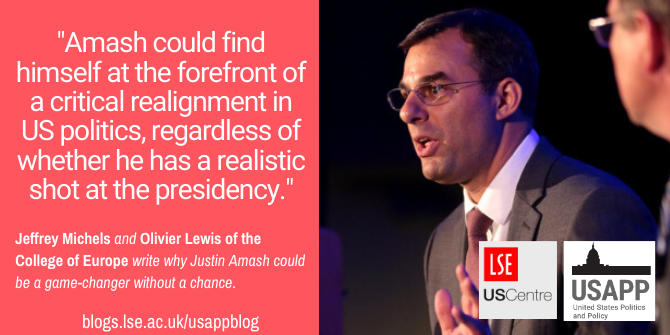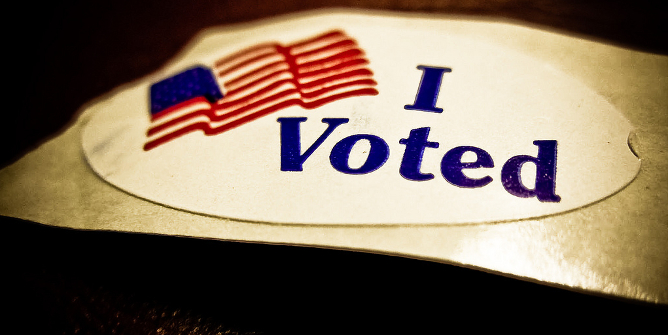
 Late last month, former Republican Representative Justin Amash announced that he was exploring a presidential bid for the Libertarian Party. Jeffrey Michels and Olivier Lewis write that if Amash is able to gain the Libertarian Party’s presidential nomination, then he could find himself the kingmaker if he is able to win over Republican voters who dislike Donald Trump. Whether he does well or not, Justin Amash’s White House bid could inspire further Libertarian candidacies in a time of growing government deficits and intervention.
Late last month, former Republican Representative Justin Amash announced that he was exploring a presidential bid for the Libertarian Party. Jeffrey Michels and Olivier Lewis write that if Amash is able to gain the Libertarian Party’s presidential nomination, then he could find himself the kingmaker if he is able to win over Republican voters who dislike Donald Trump. Whether he does well or not, Justin Amash’s White House bid could inspire further Libertarian candidacies in a time of growing government deficits and intervention.
- This article is part of our Primary Primers series curated by Rob Ledger (Frankfurt Goethe University) and Peter Finn (Kingston University). Ahead of the 2020 election, this series explores key themes, ideas, concepts, procedures and events that shape, affect and define the US presidential primary process. If you are interested in contributing to the series contact Rob Ledger (ledger@em.uni-frankfurt.de) or Peter Finn (p.finn@kingston.ac.uk).
When Representative (and former Republican) Justin Amash announced his candidacy for the Libertarian Party’s nomination for President of the United States, journalists, political strategists and election forecasters immediately debated whether his bid could steal more votes from the Republican incumbent Donald Trump or his Democratic competitor, former Vice President Joe Biden. This is a debate, then, that is framed in negative terms. Hardly considered was what Amash could add to the race, let alone his chances of winning it. To be sure, Amash has yet to even gain the nomination of the Libertarian Party, which could prove too wary to let another former Republican run on its ticket.
This pessimism about Amash’s prospects is based on the historic inability of ‘third-party’ candidates to win the presidency, an office held solely by Republicans and Democrats for the past 160 years. Outsider candidates face a number of daunting obstacles: the vast majority of US citizens (including so-called ‘independents’) identify with one of the two main parties, and except for Maine and Nebraska, the distribution of electoral votes by states is not proportional. This means that the only hope non-mainstream presidential candidates have for political significance is to deprive the leading candidate of an Electoral College majority.
As we wrote last November, this is how Libertarians could be the kingmakers of the 2020 presidential election – interestingly, Michael Bloomberg’s news service published a similar argument this February, before Bloomberg paused his campaign for the Democratic Party’s nomination. The Hill also made this Electoral College argument this May. The scenario would have been more likely had Vermont Senator Bernie Sanders won the Democratic nomination, sparking a race between two candidates whose readiness for government intervention are cause for libertarian concern. But the strength of Sanders’ base had been pulling Biden’s economic platform to the left even before COVID-19 made state spending the order of the day. Meanwhile, the Republican Party continues to favour lower taxes over balanced budgets, which left only the “ultra-libertarian wing” of the GOP to oppose the $3.1 trillion COVID-19 stimulus.
The Libertarian Party’s candidate remains, therefore, attractive to truly independent voters who want fiscal conservatism and a smaller federal government. We can note there that, as of April 2020, many US voters were concerned about the country’s “fiscal outlook”. If Trump and Republican legislators approve even more stimulus funding, even more fiscal conservatives will consider voting for the Libertarian candidate. Trump, in other words, faces a dilemma: cooperate with the Democrats or alienate fiscal conservatives.
Amash could prove a compelling candidate. If nominated, he would be the Libertarian Party’s first candidate to hold elected office as he switched from the Republican Party while still a member of Congress– although he will likely lose his seat in the upcoming elections. At 40-years-old, he would also be significantly younger than the competition, including his main opponent in the Libertarian Party’s primaries, Jacob Hornberger, a 70-year-old former trial attorney. Before the Libertarian primaries, about 5 percent of voters declared themselves ready to vote for Amash were he to run. Should he win the Libertarian Party primaries, Amash has the potential to obtain 15 percent of the pre-election polls, potentially pushing him past the threshold to debate with Trump and Biden.

“Justin Amash” by Gage Skidmore is licensed under CC BY SA 2.0
Most pundits predict that because this election will be a referendum on Trump’s tenure, third party candidates will not fare well, and the Libertarian Party will not surpass its 2016 record of 3.3 percent of the national vote. But the young and social media savvy Amash could cause a stir and do well in his home state of Michigan, a crucial swing state. If Amash is able to win over Republican voters who dislike Trump and attract young voters who are most likely to vote for third-party candidates, he could indeed become kingmaker. An even better strategy for Amash would be to withdraw from the elections in exchange for influence in the next administration. If polls continue to show Amash winning 10 percent of votes in Michigan, he will have the power to ‘spoil’ the election for one of the two main candidates (e.g. Biden).
But Amash could come to stand for something larger. Over the next decade, with government intervention, public deficits, and civil liberties all sure to weigh heavily in political debate, the US could witness a rise in libertarian and independent candidates being elected to office at all levels of US politics, much like what occurred in France four years ago with Emmanuel Macron’s upstart La République En Marche.
Interesting in this regard is how Amash described his route to the Libertarian Party. In a recent interview, he explained that his retreat from the Republican Party was necessary after having failed to pull its line towards libertarian principles – a remarkable defeat considering the strength of the libertarian Tea Party wave that swept Amash into office just a decade ago. The question now remains whether strongly ideological libertarians will try again to assert control over the Republican Party, as they have for decades, or follow Amash down a more independent path. The Republican Party will likely go through some soul-searching in the aftermath of Trump’s presidency (whether that be soon or in four years), potentially opening a door for libertarians to make another push. But if Trump’s constituency asserts its staying power, Amash could find himself at the forefront of a critical realignment in US politics, regardless of whether he has a realistic shot at the presidency.
Please read our comments policy before commenting.
Note: This article gives the views of the author, and not the position of USAPP – American Politics and Policy, nor the London School of Economics.
Shortened URL for this post: https://bit.ly/2X1cWci
About the authors
 Olivier Lewis – College of Europe
Olivier Lewis – College of Europe
Olivier has been a Research Fellow at the College of Europe, Natolin campus, since August 2019. Olivier is currently writing his first book, Security Cooperation between Western States, to be published with Routledge. He is also working on shorter publications related to counterterrorism, counterinsurgency, and Brexit.
 Jeffrey Michels – College of Europe
Jeffrey Michels – College of Europe
Jeffrey Michels is a Parliamentary Assistant at the European Parliament and an Academic Assistant for the European Interdisciplinary Studies Department at the College of Europe.







The simple solution to all this postulating about the impact of third party candidates is to replace our current electoral system with Ranked Choice Voting. First that will allow all voters to select their true preferred candidate as their first ranking while reserving a lower ranking for someone they are willing to accept. If their first choice can’t collect enough votes to actually win, their vote can ultimately transfer to someone that can. There are no “spoilers” in an RCV election so we will all be saved from the pundits post election postulating on who spoiled what for whom.
As course it also means that political commentators might have to actually talk about the contents of each candidates platform rather than their chances of winning because of a flawed voting process.